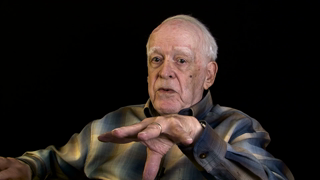4:33 | His unit was pushing inland through France and encountered stiff German resistance in hedgerow country. Radio operator Charles Commins heard incoming artillery and dove for cover, but something was sticking up a little too high and he caught some shrapnel. Doctors elected not to remove it, a decision that meant pain for him when he was sent back to the front lines.
Keywords : Charles Commins Bud Commins German radio operator hedgerow artillery shrapnel sniper penicillin England hospital France wound march

Charles Commins was accepted for an Army program that would send him to college but that was cancelled and he found himself landing at Normandy shortly after D-Day as a replacement with the 9th Division. That division had already seen action in North Africa and Sicily.
Advancing into Belgium was memorable for Charles Commins. He dove into a river to escape counter attacking Germans and lost nearly all his clothing. In the next town, local women gathered to watch an American get treatment for an embarrassing wound. Moving on into Germany in a flurry of white flags and sheets, he liberated supplies from abandoned homes.
In the Hurtgen Forest, Charles Commins found an abandoned artillery forward observer's post and directed fire as the Germans counter attacked. Soon he received his second wound from an exploding German shell. This time, while he was in the hospital, he insisted that they remove the shrapnel from his first wound, which had caused him much pain. After his recovery, he was reassigned to the Air Corps.
Charles Commins was already on his way to the ship that would take him home when the news came, Germany had surrendered. Back in the States, he was driving a jeep at an air base when he was told to prepare to leave for India and the Pacific Theater. This called for some serious beer drinking, but the next morning, he discovered the best hangover cure.